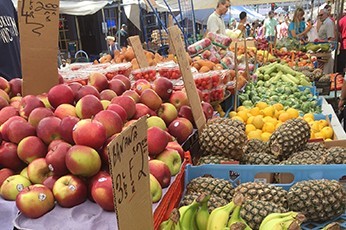



With one of every three neighborhoods classified as a food desert, Baltimore City needs to address the issue of food access for vulnerable populations.
At the same time, tons of food, in Baltimore and across the country, goes unused and is sent to landfills. One study estimates that between 31% and 40% of the nation’s food supply is wasted, with 10% of the food supply wasted at the wholesale and retail level.
The 2015 Abell Award for Urban Policy goes to a paper that proposes a creative and compelling solution to these twin challenges. In “Food Access and Waste Reduction: Proposal for a Vendors’ Market in Baltimore City,” Marie Spiker (PhD Student at the Bloomberg School of Public Health at Johns Hopkins University) and Corbin Cunningham (PhD Candidate in JHU’s Department of Psychological and Brain Sciences) propose a vendors’ market to increase access to affordable produce in Baltimore City and reduce food waste at landfills.
Based on Boston’s Haymarket, their proposal explores what such a market could look like in Baltimore and the difference it could make to health, nutrition, and environmental sustainability in the city. Spiker and Cunningham calculate that in a year, between 110,000 and 1.3 million pounds of edible food from the Maryland Food Center Authority could be sent to a vendors’ market instead of a landfill.
—
The Abell Award in Urban Policy is an annual competition for the best student paper that provides a cogent analysis of a critical issue facing the City of Baltimore and proposes well-reasoned, feasible solutions. It is open to matriculated students at all Baltimore area colleges and universities. The submissions are blind-reviewed by a panel of distinguished judges. The winning paper receives a $5,000 award and is distributed to key policymakers and opinion leaders and posted on the Abell Foundation’s website.
Photo courtesy of Sheila Spiker.